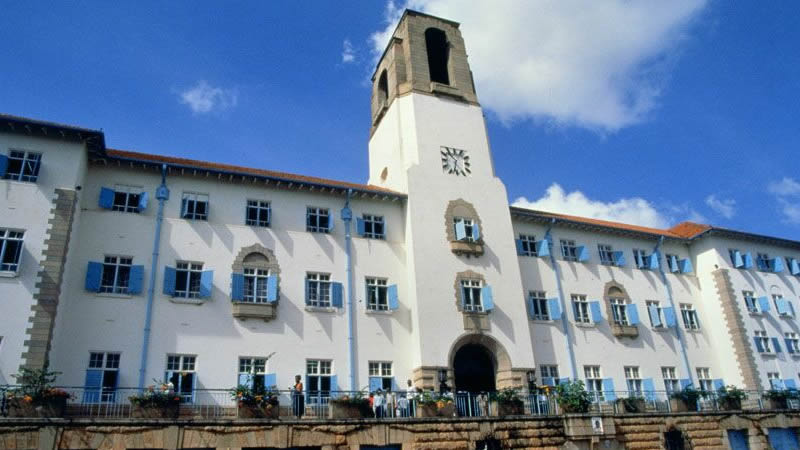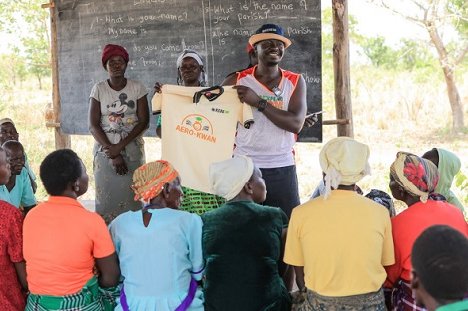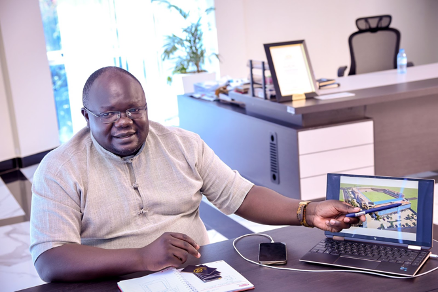By Charlotte Ntulume
In January 2024, President Yoweri Museveni appointed Dr. Sallie Simba Kayunga, commissioner, on the Electoral Commission. Dr. Simba, a former senior lecturer in the Department of Political Science and Public Administration, served Makerere for close to four decades. He spoke to The Legacy in March about his unexpected entry into academia in 1987 after elders chased him out of the village, his reflections on Makerere’s relevance to the country and East African region, and his journey from the rice shamba at his father’s home to the corridors of power.
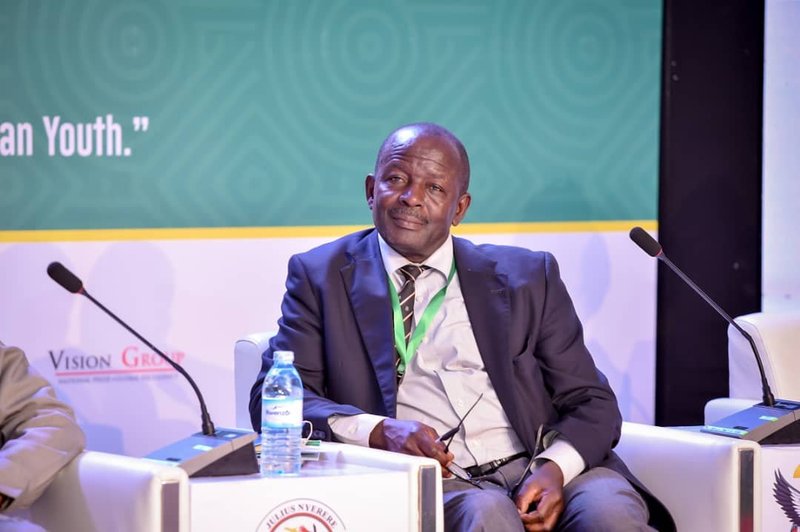
Dr. Simba attending a conference at Makerere University
Q: Please tell us about your background and journey to Makerere University.
A: I was born on 24th October, 1963 in Kabwangasi sub-county, in present-day Butebo District in Eastern Uganda. I attended Kabwangasi Primary School from 1969 to 1976, and joined St. Peter’s College Tororo in 1977, where I completed O-Level in 1980 and A-Level in 1983. I was admitted to Makerere University in 1984 for a Bachelor of Social Sciences degree, and upon completion in 1987, I started teaching at Makerere almost straight away. In October 1987 when I was appointed teaching assistant in the Department of Political Science. I later enrolled for the Master of Arts in Public Administration and Management at Makerere, which I did from 1993 to 1995, and then went on to Roskildde University in Denmark for doctoral studies, from 1996 to 2000. After that, I returned to my teaching job at Makerere, where I remained until January this year.
Having grown up in a poor background, I looked at university education as the key to success in life, so I could not take anything for granted. When I completed the bachelors in 1987, my initial interest was to join the National Resistance Army, but somebody convinced me that I would do better in academics. The next offering was journalism. My former teacher, Mr. Wafula Ogutu, offered me a position at The Weekly Topic newspaper. I requested him to let me rest for one month, but when I went upcountry, I spent two months instead. I opened up a rice garden on two acres and got busy working there until people in my community chased me away. That’s a story I normally like to recount.
At that time, I was only the third graduate in my sub-county. The people would pass by in the morning and see me digging and say, “We didn’t know that educated people could also end up coming back to the village to dig!” I thought it was a compliment until a delegation of elders came to our home, sat my father down and said, “We appreciate that your son likes to stay with the community and do what the community does, but we don’t want him here.” For the sake of their children, they wanted me out of the village because they thought if the younger folk saw this graduate digging like everyone else, they would not have any motivation to go to school. That’s how the community chased me away, and I’m very grateful for that.
So I came to Kampala to check on Wafula Ogutu at The Weekly Topic and, unfortunately – or fortunately, in hindsight – he had given my place to a former classmate, Kevin Aliro, on the very day I had come to report. I didn’t take offence; in any case, I was the one that had delayed. From there, I went to Makerere just to see what was going on at campus, and I ran into Professor Apollo Nsibambi. In spite of the ideological differences we had at that time, he dragged me almost by the ear to his office. He used to call me “Marxist”. “You Marxist!” he said, “We’re recruiting teaching assistants. Much as you used to give me a headache in class, I think you’re the right person to work with us.” He ordered me to apply and I did, very sceptically. Heads of department had a lot of power at that time, and the next day, I started working. I respect the late Professor Nsibambi a lot. He looked beyond our ideological differences, and I hold him dear for that. That is how I became an academic at Makerere. You could call it sheer luck, but I think God directs me in a number of things, including this appointment to the Electoral Commission.
Q: Reflecting on your time at Makerere, what are your favourite memories as a student?
A: When I joined Makerere, I had initially been admitted for Sociology, Social Administration and Psychology, but I changed to Political Science. Interestingly, I thought later that I should drop it, but my performance after first year was extremely good and I was compelled to do Political Science 3-1-1. Of course, we had intellectual giants like Professors Mahmood Mamdani, Apollo Nsibambi, Tarsis Kabwegyere, Dan Mudhoola, Ginyera Pinycwa and others. At that time, these leading professors taught the first-year classes and gave us a lot of inspiration. In fact, missing any of their classes was unthinkable. What I see nowadays is that some senior members are running away from first-year classes because of the huge student numbers. In the process, the students are not given that inspiration. Not that those who are teaching don’t have the knowledge. They do, but having knowledge and inspiring others are two different things.
Q: Speaking of inspiration in the classroom, Makerere was also very influential in shaping Uganda’s political consciousness. The university used to host public lectures that set the country on a particular trajectory. Does the university still possess such clout?
A: I think Makerere still has the influence, although the approach might have changed. There are two or three approaches to influencing government policy. One is the traditional academic approach of assessing, auditing and suggesting reforms – having public conversations about what’s going on, making critical remarks where you think things are going wrong, and writing papers on what you think ought to be done. The second approach, which some people may interpret as government trying to influence academia, is a situation where the government acknowledges weaknesses in certain areas and then approaches the institution and asks for guidance and support. In this regard, especially in the field of political science, there are a lot of examples we can cite.
When the country decided that there should be a new constitution, Professor Dan Mudhola was appointed vice chairperson of the Constitutional Commission, established in 1988. Similarly, Professor Foster Byarugaba, who was head of Political Science, was part of the Constitutional Review Commission that was chaired by Professor Frederick Sempebwa. When the World Bank and other external agencies came up with the idea of public service reforms, again, Professor Byarugaba was chosen to head the Public Service Review. We should also not forget Professor William Senteza Kajubi’s role in educational reforms. More recently, around 2001, when the Uganda People’s Defence Forces (UPDF) needed to put in place reforms, they invited Professor Lakidi Ocaya, Dr. Elijah Mushemeza, and Dr. Phillip Kasaija Apuuli. Together with other stakeholders, they came up with a White Paper on Defence Transformation (2004), which has been a blueprint for changes within the UPDF.
Then, when the Senior Command and Staff College was established in 2003, the commandant at that time, Gen. Ivan Koreta, wrote to the vice chancellor (VC) requesting for assistance. Middle-level commanders who were going to take up managerial positions in the army needed skills in leadership, in understanding international systems and threats, and research methodology. The letter was very clear. Much as they knew how to handle the military part, they wanted the university to help them in developing these skills to make our soldiers competitive globally. In addition to the military training, they needed academic qualifications. I was lucky that Professor Livingstone Luboobi, who was the VC at that time, appointed me to be in charge of that collaboration, where we worked with the UPDF in transforming some of their military courses into academic degree programmes.
These are just a few examples that show that Makerere is still shaping what’s going on. So, I see a slight departure from the old system of holding public seminars and criticising whatever is going on, to an approach where the government genuinely recognises that it has weaknesses and comes to the university, which then helps to sort them out.
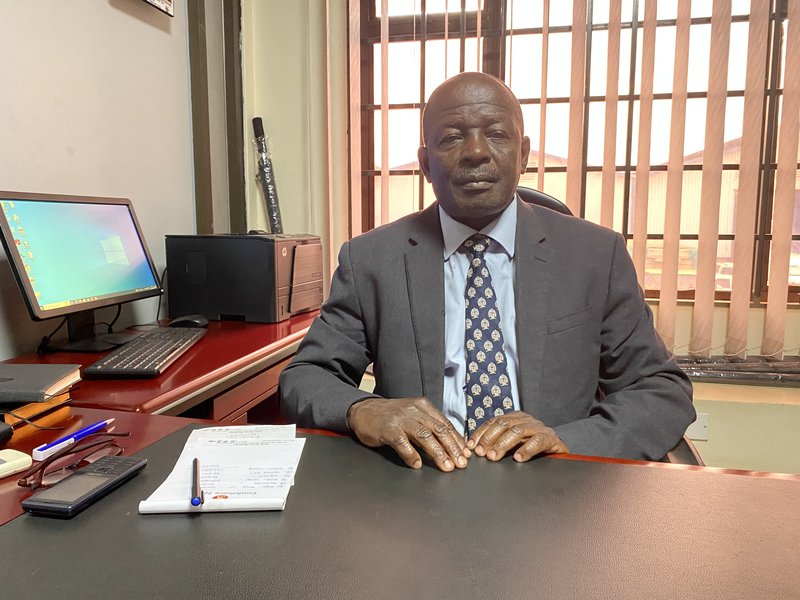
Dr. Simba at his office at the Uganda Electoral Commission
Q: Makerere University is the alma mater of many post-independence African leaders in various fields: politics, literature, economics and others. Do you think Makerere is still producing notable personalities that would influence the direction of the country and region?
A: Let us first put history into context. Before 1969, there was one university for East Africa. Logically, we had to produce the elite of the entire eastern and central African region. The University of East Africa ceased to exist in 1969, and Makerere was born, along with the University of Nairobi and the University of Dar es Salaam. As long as they were the only universities, they played big roles for the entire region. The liberalisation of university education in the 1990s saw the formation of hundreds of universities. So, judging Makerere under a liberalised context where they are competing with more than 200 universities, and comparing it with the time when it was the only university, may not be fair.
Additionally, almost 20 per cent of the students at Makerere in the 1990s were from the sister countries, so they inculcated the spirit of Pan Africanism and East Africanism. I’m leaving Makerere when a significant number of students in the Political Science Department are from South Sudan, and other countries in the region. I also always refer to the military colleges that Makerere has supported. They have students from all over East Africa and beyond, and Makerere is building a capacity for the military in Kenya, in South Sudan, Tanzania, Rwanda, South Africa, and others. So, in my view, irrespective of this competition and liberalisation of university education, Makerere is still a strong factor in the region.
Q: In what specific ways has your time of service at Makerere contributed to the person you are today, especially with regard to leadership?
A: We’ve had a lot of challenges at Makerere, such as regarding pay, but some of us have been a little cautious and grateful, regardless. First, the way Professor Nsibambi recruited me – it was not irregular, but that was the framework at that time. Then, when I started my Masters in Public Administration at Makerere, some people insisted that I had to pay for myself, but Professor John Sebuwufu, who was the VC, took a decision and the university paid for my studies. I’m indebted to him. I later went to pursue my PhD in Denmark, in Political Science (majoring in Democratic Governance) at Roskilde University, but the allowance was very small. The fact that Makerere granted me study leave with pay contributed to my success. With the different vice chancellors, either I’ve been lucky or it has been the power of God’s hand – not that I’ve been so close to them.
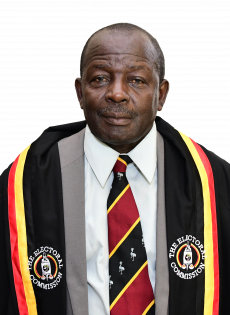
Dr. Ssali Simba Kayunga in his offical attire as a Commissioner of Uganda's Electoral Commission
When the UPDF wrote to Makerere as I earlier said, Professor Luboobi could have chosen somebody else, but he directed me and said, “Simba, work with UPDF and make sure the collaboration succeeds.” Working with UPDF has exposed me to several people in government. When Professor Ddumba Ssentamu was VC, the Ministry of Finance, Planning and Economic Development wrote to Makerere requesting two names to represent academia on the National Governing Council of the African Peer Review Mechanism (APRM). I don’t know what Professor Ddumba had in mind, but my name was one of the two he forwarded to Cabinet for approval, and I was subsequently appointed. This role enabled me to attend summit meetings of heads of state on behalf of academia.
When Professor Barnabas Nawangwe came in as VC and my four-year term ended, the Ministry of Finance wrote again, asking Makerere for two names. Interestingly, they said, “tell us why we cannot re-nominate Simba”, and so he endorsed my going back to the APRM. I wasn't there because of my association with people in power, as some critics think. It was Makerere that appointed me and enabled me to have this exposure to African heads of state. So, I’m very happy that I’ve made a modest contribution, but also that Makerere has exposed me and given me the opportunities that have led to this new appointment. Reflecting on my vetting by parliament, it was quite interesting that half of the MPs on the committee, possibly even more, were my former students. There was a lot of excitement. What was interesting is that the Speaker – who is not a former student of mine, but I think they might have had a discussion – talked about my life at Makerere and the positive contribution I’ve made at that institution, and expressed desire that those attributes should be transferred to the Electoral Commission. Who wouldn’t be happy with that experience? In short, Makerere has made me what I am, irrespective of the challenges I may have gone through. I’ll always remain indebted.
Q: As a commissioner at the Electoral Commission, you are at the centre of electoral politics. How do you intend to apply what you have learnt at Makerere to your new role?
It is theory versus practice. At Makerere, I have been teaching about democracy and elections at theoretical level. Here I am going into the practical realities of electoral politics. I’m only over a month now into the role, and I’ve given myself three months to learn. I don't want to come in with the attitude that because I have the doctorate, I know these things, and impose systems on what exists here. Much as I have the theory, I’m also meeting people who have been here for over 20 years. They have practical experience and at times, you will see things differently. I’m very happy because I’m the first political scientist to be appointed to the Commission, and probably there is a lot of expectation from society. But, in spite of that, I prefer to learn first from people’s practical experience.
Q: Can universities, and in particular Makerere, contribute to strengthening the electoral process in Uganda?
A: Makerere has a role to play, not only in elections, but also in democratic processes in the country. There is the formal part of it, especially from the department I’ve come from. When we started the course ‘Democracy and Human Rights’, one of the objectives was to make Ugandans conscious of their rights, understand democracy and be active in the democratic processes. So, that’s one part. The second is the activist role. Makerere and the academicians in general have been writing, assessing the way elections have been conducted in Uganda, and making suggestions for reforms. For example, in their book, Controlling Consent: Uganda’s 2016 Election, published in 2016, Professors Joe Oloka-Onyango and Josephine Ahikire (editors) highlighted the issue of rights of prisoners and diaspora to vote. Much as it has not been concretized, it’s one of the issues that have been taken on as areas of reform.
Makerere has been playing indirect roles, including helping political parties to develop their capacity. We’ve been doing this as consultants at individual level, but that still is an input. There is the National Consultative Forum here at the Electoral Commission – a constitutional framework that brings together all political parties. They meet several times in a year and seek advice from academicians. I have been playing that role, along with colleagues. So, Makerere contributes, either as an institution or as individuals, towards developing the capacity of actors in the electoral process.
Q: When you look back at your life and work so far, what gives you the most pride?
A: I’ve been teaching at Makerere since October 1987, and enjoying my job. One thing that makes me contended is to see my former students succeed in life and happy. Whatever conditions I’ve gone through and challenges I’ve encountered at Makerere, the fact that for the 36 years, more than 25,000 students have gone through my hands and they are occupying very strategic positions in this country and making a contribution, I was retiring from Makerere as a happy man, even when I knew the kind of life I was going to face out there.
End
Related News
![]() Please join hands with the Makerere University Endowment Fund as it works towards attracting & retaining the best faculty, providing scholarships, and investing in cutting-edge research and technology.
Please join hands with the Makerere University Endowment Fund as it works towards attracting & retaining the best faculty, providing scholarships, and investing in cutting-edge research and technology.
